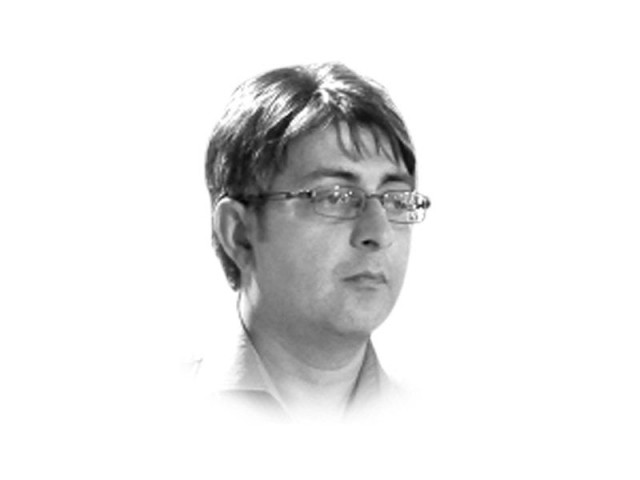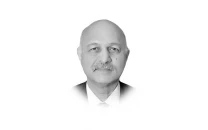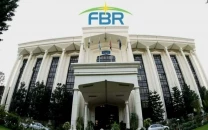A dissenting note
Dissent in a society creates enough breathing space for great minds to work and enrich the culture

The writer is an Islamabad-based TV journalist and tweets
@FarrukhKPitafi
Shahab also explains how the initiative of a few writers compelled him to work for the creation of Pakistan Writers’ Guild. These writers were Ibn-ul-Hasan, Ibn Saeed, Jameel-ud-din Aali, Zameer-ud-din Ahmed, Abbas Ahmed Abbasi, Ghulam Abbas and Hyder. You may have come across a few of these names in your life especially if you have an interest in Urdu literature, but I really wonder how many of you know that there ever used to be such a thing called Pakistan Writers’ Guild, or that a shadow of its former self continues to exist even today.
Pakistan had a wellspring of creativity. It is all but dry now. With the shrinking space for dissent and barking, there was little room left for the creative minds to survive whose work could easily offend the delicate sensibilities of the king. Look around today. How many new literary works are being published today? How many great poets you see among us. Urdu that once offered you legends like Ghalib, Ratan Nath Sarshar and Sajjad Haider Yaldram, is gasping for dear life. Our regional literature, meanwhile, remains malnourished and underdeveloped. Even copycats have stopped bothering now. Travel abroad and you may find gems from our literary past living lives of anonymity in exile. With the flight of creativity only a creative mess is left behind. We are living it. Pakistan is ranked 111th on the 139 country strong Global Creativity Index. We are ranked 113th in a list of 127 countries that is Global Innovation Index. Overpoliticisation of creative space and radicalisation of religious thought ensured that our gross intellectual product would remain smaller than a grain of rice.
Presence of dissent in a society creates enough breathing space for great minds to work and enrich the culture. In many countries, including ours, dissent is considered something disruptive if not downright destructive. But as the left’s renowned British-Pakistani writer and public intellectual Tariq Ali grudgingly admits in the preface to The Verso Book of Dissent titled ‘In praise of dissent’, it exists in more than one shape. He writes, “There are, of course, forms of dissent within established structures whose aim is to strengthen the existing order by preventing obvious errors that might lead to the most extreme form of dissent: revolutions … from below.” But in systems given to inertia, paranoia and stubbornness this point is lost. Every dissenter must be a heretic or an enemy of the state.
The above-mentioned book on dissent is an excellent read. It is a beautiful anthology of works by dissenters through ages and their contributions to the civilization. If you get time read it and also Tariq Ali’s brilliant Islam Quintet. In the set of these five historical novels Ali weaves beautiful tales of culture surrounding the rise and fall of Muslim power around the world. For those accustomed to reading Naseem Hijazi’s version of same events the contrast may prove stunning. Ali tells us that during the high tide of various Muslim cultures dissent and heresies were happily tolerated by society. In return these dissenters and heretics joined other citizens in defence of their homeland when wars became inevitable. He also makes a point of highlighting how Jews were an integral part of these societies. Tariq Ali is son of Mazhar Ali Khan, the last editor of the Pakistan Times before Ayub Khan decided to seize control of it. That is how bad we have been towards dissent.
Censorship is not something new in Pakistan. The history of censorship is older than the country itself. Three days before its formal birth the state had already begun censoring its founder. Quaid-e-Azam Muhammad Ali Jinnah’s speech of August 11, 1947 was heavily edited before it was released for public consumption. Its radio recording seems to have been destroyed since then. Considerable amount of our history has been lost owing to spells of censorship since the country’s inception. And it all boils down to the hardening of the state narrative. When Jinnah’s speech was being censored, the editors thought that it was a direct negation of the two-nation theory, the foundational narrative of the state. He after all had stated: “You will find that in course of time Hindus would cease to be Hindus and Muslims would cease to be Muslims, not in the religious sense, because that is the personal faith of each individual, but in the political sense as citizens of the State.” Little did they realise that the founder of the nation was in the best position to decide the nation’s future course of action. As I pointed out last week, since then the state has been exceptionally successful in selling the two nations narrative. Not only is the theory alive but it has become so powerful on both sides of the border that it is distorting the behaviour patterns of the two nations.
But it was not enough. This foundational ideology or narrative was weaponised during the Afghan jihad. The prescient ones kept warning that it would all end in tears. Yet their dissent was dismissed as treason. Still they were proven right. Pakistan has lost over 70,000 lives in the last decade and half fighting terrorism unleashed during that war.
Now that the country is recovering from the trauma of this seventeen year-long war, narratives are hardening again. It seems we are back in the time of inventing new parties, vanquishing old traitors and silencing good-for-nothing cynics and naysayers. The new breed of political patriots keeps raising the bar of nationalism. As if conforming to old narratives was not enough, now we are told that while praising Iqbal, the country’s national poet, we must adhere to Zaid Hamid’s interpretation of his work. So be it.
These new rules of engagement do not trouble me as much as the prospects of another flight of intellectual capital. In a badly polarised world with countless challenges for Muslims and Pakistanis abroad a truly tolerant and pluralistic culture could add great value to society and the economy. But farsightedness isn’t quite our national strong suit. We can bark our hearts out until silence takes over. Or perhaps there is no point in doing that either.
Published in The Express Tribune, April 19th, 2018.
Like Opinion & Editorial on Facebook, follow @ETOpEd on Twitter to receive all updates on all our daily pieces.














COMMENTS
Comments are moderated and generally will be posted if they are on-topic and not abusive.
For more information, please see our Comments FAQ